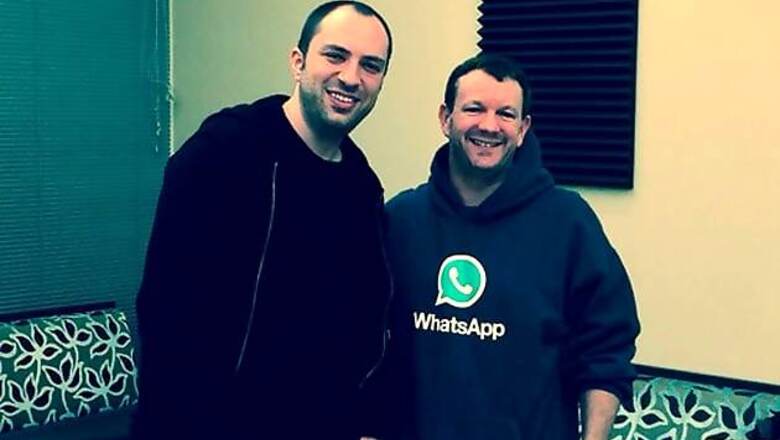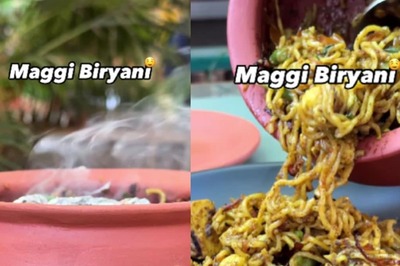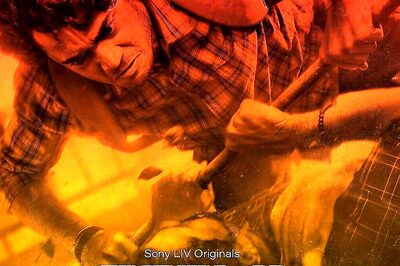
views
New Delhi: "While others sought attention, Jan and Brian (WhatsApp co-founders) shunned the spotlight, refusing even to hang a sign outside the WhatsApp offices in Mountain View," wrote venture capitalist Jim Goetz in a post on behalf of Sequoia Capital, the only venture firm that backed WhatsApp. This statement in itself speaks volumes about the co-founders of the messaging company that Facebook announced it will buy for $19 billion.
Founder and Chief Executive Officer Jan Koum, 37, grew up mostly in the Ukraine, and moved to Mountain View, California, as a teenager, an immigrant path reminiscent of other Silicon Valley successes such as Max Levchin, the Ukrainian-born co-founder of Paypal, and Google's Russian-born co-founder, Sergey Brin.
When Jan arrived in the US, he was only 16-years-old. His family was struggling financially and initially they lived on food stamps. "Jan Koum's family collected food stamps a couple of blocks from the unmarked Mountain View office that now houses his messaging company, WhatsApp," says Wired's David Rowan.
While Brian Acton in 2009 was rejected by both Facebook and Twitter. "Facebook turned me down. It was a great opportunity to connect with some fantastic people. Looking forward to life's next adventure," reads his tweet from August 2009. His another tweet from 2009 reads, "Got denied by Twitter HQ. That's ok. Would have been a long commute."
WhatsApp grew up in Silicon Valley, but its founder's background in Eastern Europe gave it its DNA. Like technology titans Bill Gates and Mark Zuckerberg, Koum dropped out of college, but in his case, it was San Jose State rather than Harvard. Koum's eastern European background was key to WhatsApp's creation, according to Jim Goetz.
Jan keeps a note from Brian taped to his desk that reads "No Ads! No Games! No Gimmicks!" This messages acts as a daily reminder of their commitment to stay focused on creating a pure messaging experience. It's a reflection of their unshakeable beliefs.
Unlike companies such as Google and Facebook, which try to learn as much as possible about each user, WhatsApp does not collect personal information such as name, gender, or age, Goetz wrote in a blog post, and messages are deleted from servers once delivered.
"Jan and Brian ignored conventional wisdom. Rather than target users with ads - an approach they had grown to dislike during their time at Yahoo - they chose the opposite tack and charged a dollar for a product that is based on knowing as little about you as possible," opined Goetz.
WhatsApp has done for messaging what Skype did for voice and video calls, Goetz added.
"It's a decidedly contrarian approach shaped by Jan's experience growing up in a communist country with a secret police," Goetz wrote. "Jan's childhood made him appreciate communication that was not bugged or taped."
Koum's view was evident in a tweet he wrote last year about Iran and Turkmenistan blocking WhatsApp.
"When government gets in the way, consumers and freedom to communicate suffers," he wrote.
He also sees advertising as an imposition.
"When advertising is involved, you the user are the product," Koum wrote in a 2012 blog post, disparaging the effort other companies make to collect personal data. That same year, he quoted singer Kanye West in a tweet, writing, "You think you free but you a slave to the funds, baby."
WhatsApp charges 99 cents a year, and that bargain-basement approach extends to the WhatsApp's original office, according to Yoav Leitersdorf of YL Ventures, who visited in 2010 in an attempt to invest in the young company. He's still impressed by both the founders and what he saw.
"It was like a car dealership with no cars inside and hardly any furniture at all for that matter," Leitersdorf recalled. "I remember parking my car and walking around the building for about five minutes or more, looking for the office door." The office contained a handful of desks atop a stained wall-to-wall carpet, he said.
He also has given a shout-out or two to his adopted country. "WhatsApp Messenger," he tweeted last year. "Made in USA. Land of the free and the home of the brave."
Facebook pledged a break-up fee of $1 billion in cash and $1 billion in stock if the deal falls through. Zuckerberg and Koum said that WhatsApp will continue to operate independently, and promised to continue its policy of no advertising.
The messaging company has now become a global force, with 450 million customers who find it an easy way to send messages across borders and between different brands of mobile devices.####
Jan keeps a note from Brian taped to his desk that reads “No Ads! No Games! No Gimmicks!”
Facebook turned me down. It was a great opportunity to connect with some fantastic people. Looking forward to life’s next adventure.— Brian Acton (@brianacton) August 3, 2009
Got denied by Twitter HQ. That’s ok. Would have been a long commute.— Brian Acton (@brianacton) May 23, 2009
(With inputs from Reuters)





















Comments
0 comment